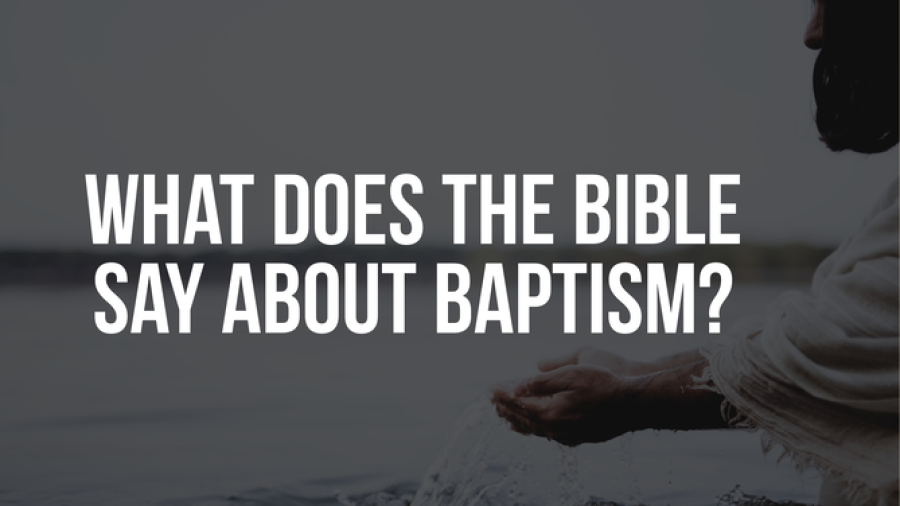What does the Bible say about baptism?
Are you searching for baptism Bible verses? What is baptism according to the Bible? Let’s find out! One of the biggest questions in Christianity is the nature and purpose of water baptism.
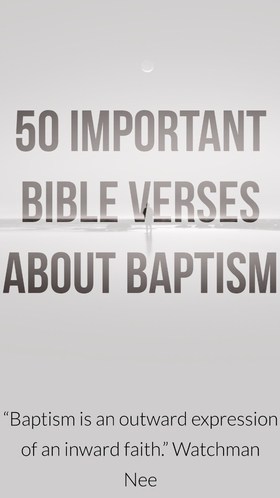
To even ask the question ‘what is baptism and what is it for’ is to drag other things into the debate, such as the definitions of the word ‘baptism’ in Greek, the baptism of the Holy Spirit, soteriology (how we are saved), and the many historical questions of application and exegesis that face us, for instance, in the book of Acts when the word baptism is present. I want to tackle all of these things, if only briefly, in this post. The questions I will address are,
‘What is the meaning of the word baptism in the Bible?’,
‘What does water have to do with baptism?’,
‘What is the proper mode of baptism?’
‘Does baptism save?’,
‘What is the baptism of the Holy Spirit?’,
‘Why was Jesus baptized?’,
and ‘Who can be baptized and by whom?’
Christian quotes about baptism
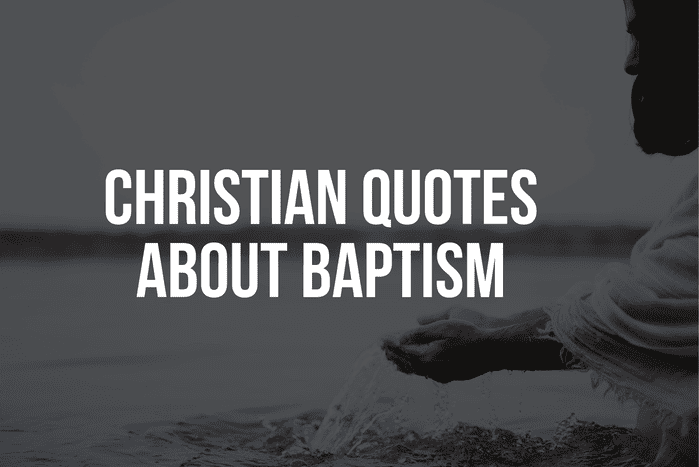
“A man who knows that he is saved by believing in Christ does not, when he is baptized, lift his baptism into a saving ordinance. In fact, he is the very best protester against that mistake, because he holds that he has no right to be baptized until he is saved.” – Charles Spurgeon

“Baptism is an outward expression of an inward faith.” – Watchman Nee
“I thought I could have leaped from earth to heaven at one spring when I first saw my sins drowned in the Redeemer’s blood.” Charles Spurgeon
“God brings men into deep waters not to drown them, but to cleanse them.” James H. Aughey
What is baptism in the Bible?
I’ll come at the question from a few angles in this post, but I won’t bury the lead. Baptism is a church ordinance or sacrament for a believer in Jesus who is publicly affirming his faith in Jesus and affirmed as Jesus’ disciple by the congregation of that man’s local church.
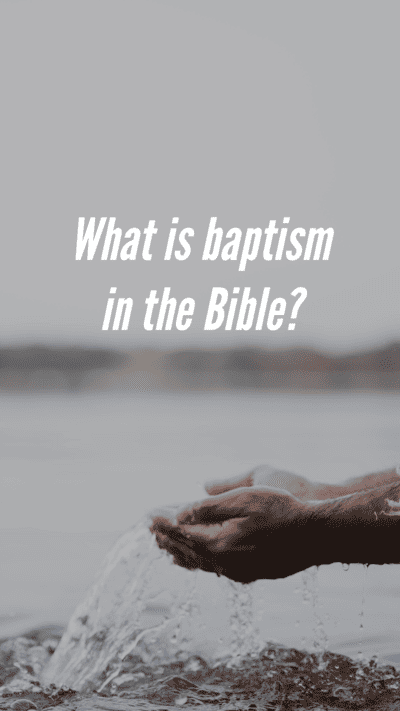
Not only do Christians hold that baptism is a symbolic ceremony meant to demonstrate a believer’s faith in Jesus Christ, but it also identifies believers with the death, burial, and resurrection of Christ. Baptism is an extraordinary symbol of being buried with Christ unto death and being resurrected with Christ in newness of life. Baptism is the outward sign of what has been done to all believers (Titus 3:5).
Baptism is an important act of obedience that is performed after a man or woman is saved. However, it is not, in and of itself, a saving act. Rather, baptism points to the saving work of Christ on the cross.
Of course, even in giving that answer I have gotten ahead of myself. Let’s start linguistically. Now, we have to recognize up front that etymology is no trump card in any but etymological discussions. If you and I are wondering whether a certain chair would float in water and a third person walks in and informs us that the early Middle English word flot (one of the words that gave us ‘float’) meant ‘sea’, which wasn’t a verb at all, so our discussion is pointless, we would easily recognize the irrelevance of his comment.
Likewise, if someone points out that baptizein in the Koine Greek generally meant to dip or immerse and expects us to have no more questions on the biblical treatment of baptism, he will be mistaken. Still, even though it can’t end our discussion, etymology is an appropriate place to begin, particularly where an unknown language is concerned. Not being a Greek scholar, I don’t have much to say. As mentioned above, immersion or plunging or dipping are the most common meanings, but there are arguments for why a few places in the NT might have something more like pouring or sprinkling or washing going in. I’ll come back to this briefly in the section on mode. For now, it will suffice to mention three different ways it’s used in the NT to give you a feel for the range of the word:
Immersion: Romans 6:4-6, Colossians 2:11-12
Trouble: Mark 10:38, 1 Peter 3:21, 1 Corinthians 10:2
Washing (possibly sprinkling): Hebrews 6:2, 9:10.
In Paul’s and Peter’s verses on baptism as trouble or ordeal, the connection is strong but not as obvious. Paul uses the word baptism to describe Israel’s passage through the Red Sea. Peter connects the worldwide flood and Noah’s safe passage through it with baptism and our salvation by Christ.
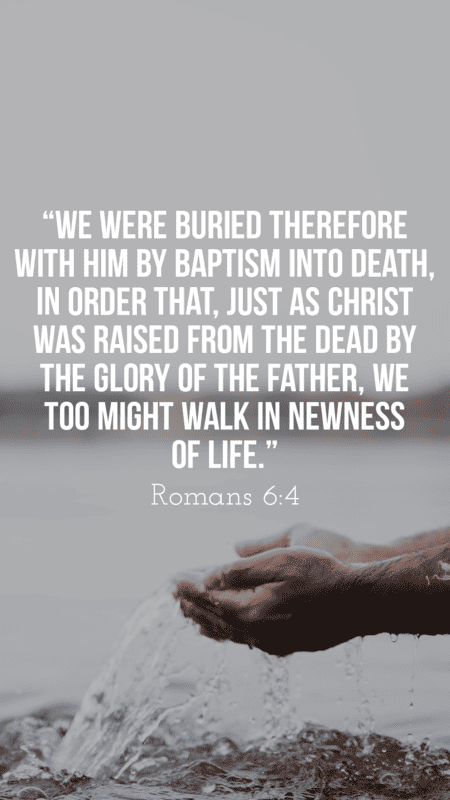
1. Romans 6:4-6 “Therefore we have been buried with Him through baptism into death, so that as Christ was raised from the dead through the glory of the Father, so we too might walk in newness of life. 5 For if we have become united with Him in the likeness of His death, certainly we shall also be in the likeness of His resurrection, 6 knowing this, that our old self was crucified with Him, in order that our body of sin might be done away with, so that we would no longer be slaves to sin.”
2. Colossians 2:11-12 “In him you were also circumcised with a circumcision not performed by human hands. Your whole self ruled by the flesh was put off when you were circumcised by Christ, 12 having been buried with him in baptism, in which you were also raised with him through your faith in the working of God, who raised him from the dead.”
3. Titus 3:4-7 “But when the kindness and love of God our Savior appeared, 5 he saved us, not because of righteous things we had done, but because of his mercy. He saved us through the washing of rebirth and renewal by the Holy Spirit, 6 whom he poured out on us generously through Jesus Christ our Savior, 7 so that, having been justified by his grace, we might become heirs having the hope of eternal life.”
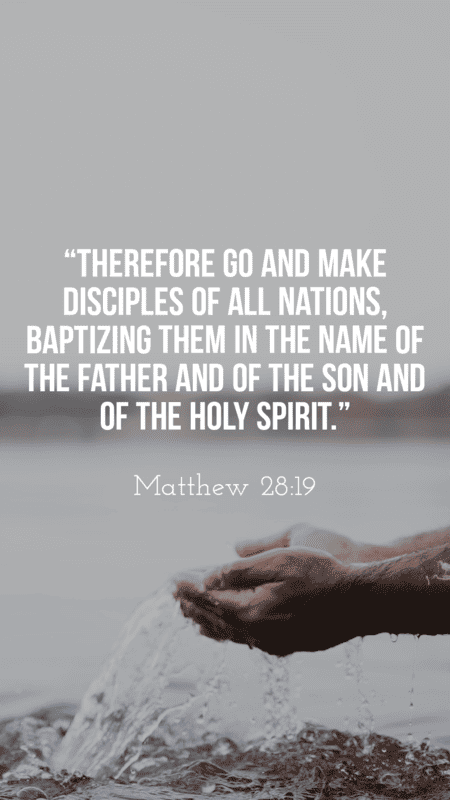
4. Matthew 28:19-20 “Go therefore and make disciples of all the nations, baptizing them in the name of the Father and the Son and the Holy Spirit, 20 teaching them to observe all that I commanded you; and lo, I am with you always, even to the end of the age.”
5. Acts 8:35-39 “Then Philip began with that very passage of Scripture and told him the good news about Jesus. 36 As they traveled along the road, they came to some water and the eunuch said, “Look, here is water. What can stand in the way of my being baptized? ” 38 And he gave orders to stop the chariot. Then both Philip and the eunuch went down into the water and Philip baptized him. 39 When they came up out of the water, the Spirit of the Lord suddenly took Philip away, and the eunuch did not see him again, but went on his way rejoicing.”
6. Acts 2:41 “So those who received his word were baptized, and there were added that day about three thousand souls.”
7. Hebrews 6:1-2 “Therefore let us move beyond the elementary teachings about Christ and be taken forward to maturity, not laying again the foundation of repentance from acts that lead to death, and of faith in God, instruction about cleansing rites, the laying on of hands, the resurrection of the dead, and eternal judgment.”
8. Matthew 3:5-6 “Then Jerusalem and all Judea and all the region about the Jordan were going out to him, 6 and they were baptized by him in the river Jordan, confessing their sins.”
9. Mark 10:38 “You do not know what you are asking,” Jesus replied. “Can you drink the cup I will drink, or be baptized with the baptism I will undergo?”
10. Luke 12:50 “I have a baptism to be baptized with, and how great is my distress until it is accomplished!”
11. John 1:25-29 “They asked him, “Then why are you baptizing, if you are neither the Christ, nor Elijah, nor the Prophet?” 26 John answered them, “I baptize with water, but among you stands one you do not know, 27 even he who comes after me, the strap of whose sandal I am not worthy to untie.” 28 These things took place in Bethany across the Jordan, where John was baptizing. 29 The next day he saw Jesus coming toward him, and said, “Behold, the Lamb of God, who takes away the sin of the world!”
What does water symbolize in baptism?
To put it briefly, baptism is a powerful symbol of cleansing. It’s symbolic for the washing away of sins. Water symbolizes a believer’s death to sin and resurrection in Christ. Having said that, let’s dive deeper into the matter.
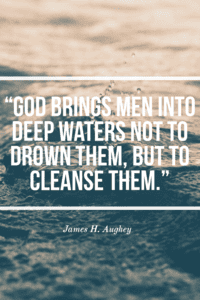
A blogger at Doctrine Unites cites Dr. Meredith Kline’s observation that John’s baptism seems to bear strong resemblance to the “water ordeals” or water traversings of the Old Testament: the Red Sea crossing, the Jordan crossing, and the Noahic flood. Moses’ salvation in a basket in the Nile comes to mind as well.
John’s baptism is a baptism of repentance, saving the recipients from the coming Messianic wrath through the water of the Jordan River (Matthew 3:7). This reading fits nicely with Paul’s typological use of baptism in 1 Corinthians 10 and Peter’s in 1 Peter 3. Water all throughout Scripture is seen as a sign of wildness and judgment, trial and overwhelming trouble for people. The seas and oceans especially get this rap. Here’s just a smattering:
First and most obviously we have the Flood account, found in Genesis 6:19-22. This was God’s great judgment of all mankind (and perhaps of certain fallen angels and their offspring, depending on who you ask), His harrowing of earth. He whittled us down to eight people and started over. This, as we will see, has something to do with baptism as we practice it in the church today. In Exodus, God brought His people to safety from the raging Egyptians through water, right as the pursuers were about to fall on them. God split the Red Sea into two bodies of water so His people could walk on dry land. The water had seemed like it would be the doom of the Israelites, but it ended up being the doom of their enemies. Some have argued that there might be a linguistic connection between the word Sheol and another word for watery depths, but in talking to a Hebrew expert, I have been told this is unfounded.
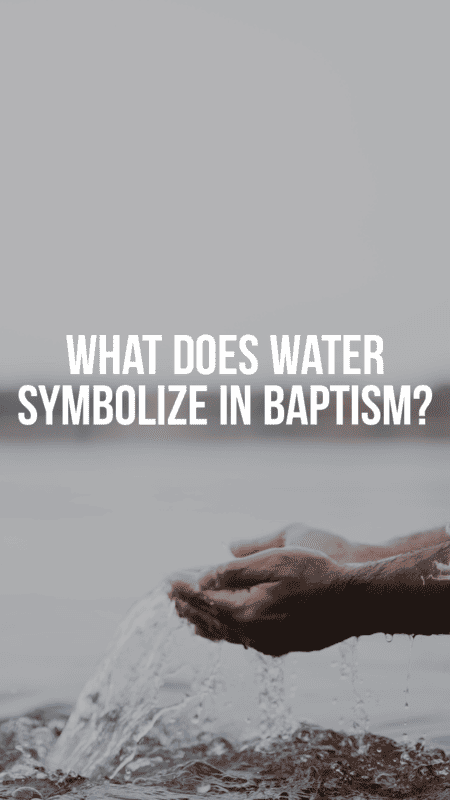
In Psalm 18:15-17 we see another such reference, as well as in 32:6. In Isaiah 43:2-3 we see implicitly that water is a devastating force which God protects His people from.
The point of all these verses is to help give us an understanding of how the Old Testament writers understood water and used its associations. Only if we grasp this can we hope to make sense of the rite of water baptism in the New Testament, from John the Baptist’s ministry in the Jordan to Peter’s Flood connection. This typological reading, found in 1 Peter 3:21, is a major pillar of my understanding of baptism, and one of the most informative verses in the Bible on it. I’ll return to it a lot in this post. That verse is one of the two most pertinent New Testament verses on baptism, depending on how it’s interpreted. The other is 1 Corinthians 10:2. Of course, water isn’t only used to symbolize judgment or the fierceness of nature. It is also life-giving in the form of rain, and pictures God’s Gospel going forth from the Temple in Ezekiel 47. God himself is spoken of as the spring of living water in Jeremiah 2:13. But the two pillar passages in the NT that connect baptism to OT events pick passages in which water is dangerous and a sign of judgment.
So the big question I’m asking in this section is ‘why water?’ What is the point of immersing someone in water to show he is a Christian? Why that instead of, say, cracking an egg over his head or anointing him with oil? What does the water immersion show that nothing else does? Well, like the chosen ones in these water ordeals, as Dr. Kline calls them, the Christian convert, as one of God’s people, is passing through waters of harrowing and judgment by God’s power and for his glory, following him in obedience and faith. At least, that’s what the waters symbolize.
For most people, I gather, baptism was not dangerous. Most of us weren’t chased by Egyptians into the baptismal tank or swimming pool. And yet, God’s wrath is dangerous and it is real. He saves his people from it if they are covered by Christ but his enemies are destroyed by it. Nothing pictures this better than the passage through the Red Sea by the Israelites and the destruction of the Egyptians by the same sea. God’s people made it through the otherwise impassable sea, probably looking up in fear at the ominously swaying and roiling walls of dark water on either side of them. They saw God’s wrath but did not feel it.
The Egyptians, arrogantly looking down on their quarry and judging the passage safe, plunged in and found their mistake, and felt the wrath. This, at any rate, is an imaginative version that comes easy. And this, I submit, would not be a bad thing to have in mind before you step down into the water of your own baptism. It’s what Paul had in mind (at least partially) when he spoke of the Israelites being “baptized” into Moses in 1 Corinthians 10:2. What exactly it meant to be baptized into Moses, or into anyone for that matter, I’ll talk about more below. The worldwide flood of Genesis 6 and 7 is the only challenger for best illustration of baptism, one that Peter makes explicit in his first epistle. In this event, God cut off the unbelieving part of humanity, leaving only His chosen portion, which He brought safely through the waters on the ark. Once again, waters of judgment are restrained from destroying God’s people while wiping out His enemies.
In the Old Testament, the Jews had many ritual washings and cleansings for purifications, some of which, such as the tevilah, were immersions. Thus, water was also seen as purifying. And in fact, it’s not much of a stretch to see the connection between this and the water ordeals. If one sees purification in any of these (certainly the Flood) where–if humanity is seen as an organic whole, or at least at a scale greater than the individual human–the unclean, offending part is washed away and the clean part remains, then this is quite obviously analogous to the washing of an individual person. It seems that at some point during the Second Temple period, full-body immersions in a mikveh (something like a baptismal with steps, dug into the ground) were common in Israel. I don’t want to get bogged down here, because the question of how much we should read OT washings into the NT is contested, and I am not the one to settle it, but in a survey of water rituals in the history of God’s people, these cannot be left unmentioned.
The water ordeals and the water rituals need to be in our minds when we see the first instances of baptism in the New Testament, at the hands of John in the Jordan River. Keep in mind, though, that repentance is not yet in the picture in these OT examples. Cleansing is, but not yet repentance of sins on the part of the subjects of baptism. That’s what I want to get into next. But first, let me just briefly touch on the issue of mode.
12. Mark 1:4-5 “John the Baptist appeared in the wilderness preaching a baptism of repentance for the forgiveness of sins. 5 And all the country of Judea was going out to him, and all the people of Jerusalem; and they were being baptized by him in the Jordan River, confessing their sins.“
13. 1 Corinthians 10:2 “They were all baptized into Moses in the cloud and in the sea.”
14. Acts 2:36-38 “Therefore let all the house of Israel know assuredly that God has made this Jesus, whom you crucified, both Lord and Christ.” 37 Now when they heard this, they were cut to the heart, and said to Peter and the rest of the apostles, “Men and brethren, what shall we do?” 38 Then Peter said to them, “Repent, and let every one of you be baptized in the name of Jesus Christ for the remission of sins; and you shall receive the gift of the Holy Spirit.”
15. 1 Corinthians 6:9-1 “Or do you not know that the unrighteous will not inherit the kingdom of God? Do not be deceived; neither fornicators, nor idolaters, nor adulterers, nor effeminate, nor homosexuals, 10 nor thieves, nor the covetous, nor drunkards, nor revilers, nor swindlers, will inherit the kingdom of God. 11 Such were some of you; but you were washed, but you were sanctified, but you were justified in the name of the Lord Jesus Christ and in the Spirit of our God.”
16. Isaiah 43:2-3 “When you pass through the waters, I will be with you; and when you pass through the rivers, they will not sweep over you. When you walk through the fire, you will not be burned; the flames will not set you ablaze. 3 For I am the Lord your God, the Holy One of Israel, your Savior; I give Egypt for your ransom, Cush and Seba in your stead.”
17. Matthew 3:7 “But when he saw many of the Pharisees and Sadducees coming to where he was baptizing, he said to them: “You brood of vipers! Who warned you to flee from the coming wrath?”
18. Mark 10:38 “You don’t know what you are asking,” Jesus said. “Can you drink the cup I drink or be baptized with the baptism I am baptized with?”
19. Acts 22:16 “And now what are you waiting for? Get up, be baptized and wash your sins away, calling on his name.”
Modes of baptism
Here’s where I need to lay my cards on the table. I’m a credobaptist, meaning that I believe baptism is for those who have made a credible profession of faith in Jesus (I’ll get into a bit of what I mean by credible later). This is opposed to the paedobaptist view which says that infants of at least one believing parent are also fit subjects of baptism.
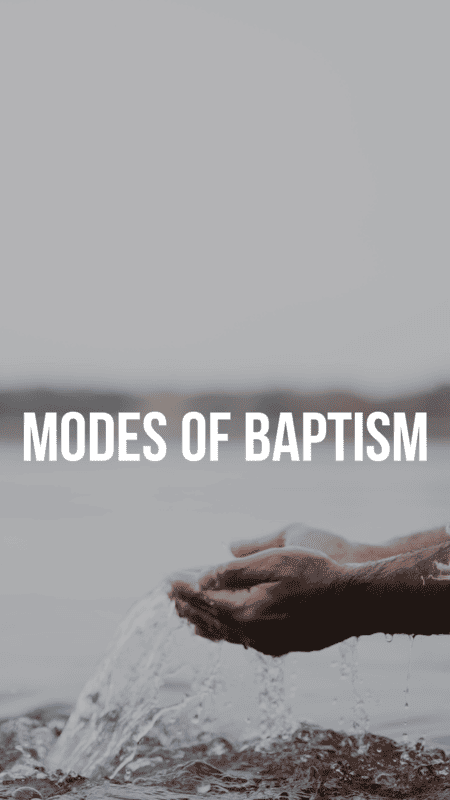
Historically, credobaptists have almost unanimously espoused immersion as the one proper mode of baptizing a person, Martin Lloyd-Jones being a famous exception. I believe that full-body immersion is the best way to baptize, but not the only legitimate way, if circumstances force one to pour or sprinkle instead. It seems that most agree the word bapto and baptizo refer to dipping or immersing, but the paedobaptists (and other non-immersionists) argue that these words do not pertain to mode at all. They argue that, for baptizo at least, the word merely refers to what is symbolized: the uniting of a believer with Christ and His body, the Church.
They point to verses such as Hebrews 6:2 and Hebrews 9:10 where the Greek words βαπτισμῶν (baptismon) and βαπτισμοῖς (baptismois) are used. The “washings” referred to in both these verses would almost certainly not have been bodily immersions but hand-washing or other limited uses of water. Of course, immersionists have responded that the word could be understood to mean immersions of these specific body parts, thus fighting to preserve the meaning of all bapto-related words as immersive. But then, the non-immersionists will say that pouring would have often been involved to wash persons when no flowing water, as in a river, was available, and so the debate goes on.
Pourers and sprinklers will also point to Titus 3:5-6 in connection with Matthew 3:11, saying that Christ’s pouring out the Holy Spirit on us is the fulfilment of John the Baptist’s promise that Christ would baptize us with the Holy Spirit just as John baptized with water. Surely this pouring of the Spirit from above should lead us to accept pouring water over the head of the baptizee as a legitimate mode of baptizing. The immersionist, however, will certainly point out that the Greek word here used is not baptizo but ekcheo, a word for pouring specifically, and that we needn’t think the Biblical authors bound to the use of only one metaphor for the dispensing of the Spirit; John used a washing metaphor, Paul here uses a pouring one. Both refer to our reception of the Holy Spirit.
But the immersionist can be counted on to rely most heavily, among all Scriptures, on Romans 6:3-4, which says, “Do you not know that all of us who have been baptized into Christ Jesus were baptized into his death? We were buried therefore with him by baptism into death, in order that, just as Christ was raised from the dead by the glory of the Father, we too might walk in newness of life.” Baptism is thus a picture of burial with Christ. As Christ was buried, so were we if we have been baptized with Him. What mode of baptism most evokes burial? Immersion of course. For me as a credobaptist immersionist, this is a strong argument.
The odd thing to me is that not many non-immersionists seem to read this passage in the one way that would weaken the case against them. I refer to reading baptism as denoting spiritual union with Christ, justification, rather than the physical rite. This is actually the way I tend to read it, at least right now (I’ve gone back and forth). It’s even more odd because most non-immersionists are paedobaptists, and interpreting this baptism spiritually also gets them out of the trouble of explaining the strong connection between baptism and regeneration in these verses as well as 5-10.
If that connection is really here, the question they must answer is how baptism could be for anyone who has not died to sin by repenting of it and placing faith in Jesus. It would seem that infants cannot do this, so why should we baptize them? If baptism here is another way of saying ‘repentance’ or ‘regeneration’ or ‘salvation’ then the physical rite need not come into it, at least not directly.
Enough on mode.
20. John 3:23 “John also was baptizing at Aenon near Salim, because water was plentiful there, and people were coming and being baptized.”
21. Hebrews 6:2 “Of the doctrine of baptisms, and of laying on of hands, and of resurrection of the dead, and of eternal judgment.”
22. Hebrews 9:9–10 “Which is a symbol for the present time. Accordingly both gifts and sacrifices are offered which cannot make the worshiper perfect in conscience, 10 since they relate only to food and drink and various washings, regulations for the body imposed until a time of reformation.”
23. Hebrews 9:13–14 “For if the blood of goats and bulls and the ashes of a heifer sprinkling those who have been defiled sanctify for the cleansing of the flesh, 14 how much more will the blood of Christ, who through the eternal Spirit coffered Himself without blemish to God, cleanse your conscience from dead works to serve the living God?”
Does baptism save you?
This is the most important question one can ask regarding baptism and the answer separates churches by a deep gorge. The Roman Catholic and Eastern Orthodox churches, all believe in baptismal regeneration (the belief that baptism saves you), whereas the vast majority of the world’s Protestants do not. This is one of the big issues that keep these communions separate today.
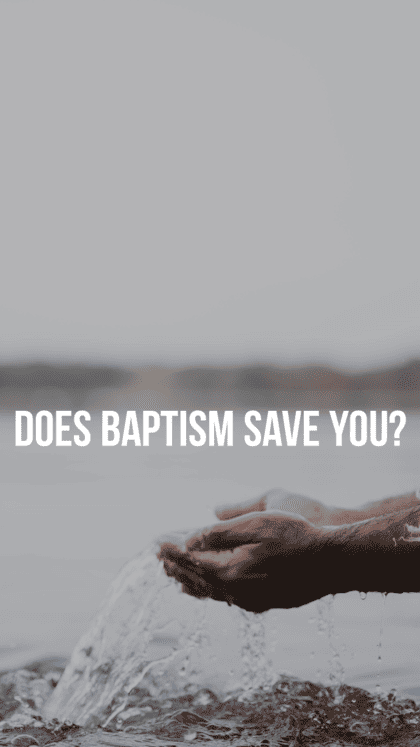
First, it is clear from 1 Corinthians 1:14–18; Ephesians 2:8-9; 1 Corinthians 15:1-4; and a plethora of other passages that it is the Gospel that saves us, not baptism.
In this section, I will fight to defend the biblical position that water baptism does not save. I will also give a few of the Biblical texts which those on the other side of this issue commonly cite.
The question of which line to take on this gave me pause. Should we prioritize the historical (including, and primarily, Biblical) practice of baptism, or statements taken as definitional of it, such as 1 Peter 3:21? This brings in the question of which verses use ‘baptism’ as another word for salvation. And what is the place of church tradition or precedent in this debate? Baptismal regeneration, after all, has an ancient pedigree. After some thought, it seems best to me to start with concrete instances of baptism in the New Testament and work back toward the theoretical from there. Right out of the gate it seems that the vast majority of specific baptisms recorded in the New Testament occurred after and as a result of conversions. In the Great Commission in Matthew, right before Jesus ascends, he says, “Go therefore and make disciples of all the nations, baptizing them in the name of the Father, Son, and Holy Spirit” (Matthew 28:19) The discipling comes first, then the baptizing.
The Ethiopian Eunuch in Acts 8 is baptized after understanding the Gospel as explained by Philip. In Acts 10 it is once the Holy Spirit has descended upon the household of Cornelius that Peter says, “Surely no one can stand in the way of their being baptized with water. They have received the Holy Spirit just as we have.” And although the Ephesian believers in Acts 19 did not receive the Holy Spirit until they were baptized in the name of Jesus, they were called disciples before Paul baptized them. But more importantly, Paul saw fit to explain the connection to Jesus and His gospel before baptizing them. If belief and repentance were not necessary before baptism, why wouldn’t Paul have just rebaptized them, rather than bothering to explain first?
As for the verses that seem to define baptism, some only indirectly, the most prominent is 1 Peter 3:21. I did say it would come up a lot. It says, “Corresponding to that, baptism now saves you–not the removal of dirt from the flesh, but an appeal to God for a good conscience–through the resurrection of Jesus Christ…” Corresponding to what? Peter has just recounted the story of the ark bringing Noah and his family safely through the flood waters. So just as the ark saved Noah from the waters of wrath that had come on the world in judgment, an appeal to God for a clean conscience will bring us safely through God’s wrath in the name of Christ, and the picture of this is water baptism. It seems as if Peter is explaining the presence of water in this ordinance. He is saying ‘it’s not the water that saves you. It’s the Holy Spirit working in your heart to create faith which lays hold of Christ’s work.’
We are not saved by water baptism. The baptism that saves us is spiritual baptism, immersion in Christ. Immersion in Christ is seen in several passages such as Romans 6:3-4; Galatians 3:26-28; 1 Corinthians 12:13; and Ephesians 4:5.
Take this in conjunction with what Paul says in Romans 9:15-16: “For He says to Moses: “I will have mercy on whom I have mercy, and I will have compassion on whom I have compassion.” 16 “So then, it does not depend on man’s desire or effort, but on God’s mercy.” It is not any work of the law or any action that we take to try to get in good with God or earn his favor that saves us. On the contrary, the Bible is clear that it is God’s choosing and saving us which puts us right with Him. He washed (or baptized) us in the blood of Jesus. In this sense only does baptism save.
The Lutherans, for instance, will say that baptism is a work of God, perhaps thinking this clears them of any charge of salvation by works. But this is doubtful to me for two reasons. One, even if in some sense it is the work of God, it is clearly not only the work of God; it involves the agency and action of men. So it goes against common sense and is an equivocation to say that baptism is God’s action the way justification is God’s action.
Secondly, it would be more accurate to say that baptism is an act of the church. Now, surely the church can act on God’s behalf (Matthew 18:18) because the church is Christ’s body (Ephesians 4:16), but not everything that every individual local church does, filled as they are with fallen and still-sinning men, is done truly on God’s behalf. Sinful things are done in churches. No one thinks these are done in heaven or approved in heaven the way the good things are. So even if, in a sense, a true baptism of a true believer is backed by heaven and can be attributed to God, false baptisms are not. And the baptism of someone who is not a believer (at least in the case of an adult, we can all agree) is no true baptism, even if he and the one baptizing him believe the baptism will effect salvation in him.
The interesting and even confusing thing about 1 Peter 3:21 is how closely tied the water rite is with salvation in Peter’s mind. This seems to be the case throughout the New Testament. In Acts 2:38 Peter says, “Repent and be baptized, and you will be given the gift of the Holy Spirit.” In Acts 19, the Spirit does not fall on the Ephesian disciples until they are baptized in the name of Jesus. Jesus himself is only affirmed by the Spirit after (and immediately after) his own baptism. And this brings me to the next obvious question.
24. 1 Peter 3:19-21 “by whom also He went and preached to the spirits in prison, 20 who formerly were disobedient, when once the Divine longsuffering waited in the days of Noah, while the ark was being prepared, in which a few, that is, eight souls, were saved through water. 21 There is also an antitype which now saves us—baptism (not the removal of the filth of the flesh, but the answer of a good conscience toward God), through the resurrection of Jesus Christ.”
25. 1 Corinthians 1:14-17 “I thank God that I baptized none of you, but Crispus and Gaius; 15 Lest any should say that I had baptized in mine own name. 16 And I baptized also the household of Stephanas: besides, I know not whether I baptized any other. 17 For Christ sent me not to baptize, but to preach the gospel: not with wisdom of words, lest the cross of Christ should be made of none effect.
26. Ephesians 2:8-9 “For by grace you have been saved through faith, and that not of yourselves; it is the gift of God, 9 not of works, lest anyone should boast.”
27. 1 Corinthians 12:13 “For we were all baptized by one Spirit so as to form one body—whether Jews or Gentiles, slave or free—and we were all given the one Spirit to drink.”
28. Galatians 3:26-28 For ye are all the children of God by faith in Christ Jesus. 27 For as many of you as have been baptized into Christ have put on Christ. 28 There is neither Jew nor Greek, there is neither bond nor free, there is neither male nor female: for ye are all one in Christ Jesus.
29. Ephesians 4:5 “One Lord, one faith, one baptism.”
30. Romans 5:1-2 “Therefore, since we have been justified by faith, we have peace with God through our Lord Jesus Christ, through whom we have gained access by faith into this grace in which we now stand. And we boast in the hope of the glory of God.”
31. Romans 3:24-26 “Yet God, with undeserved kindness, declares that we are righteous. He did this through Christ Jesus when he freed us from the penalty for our sins. For God presented Jesus as the sacrifice for sin. People are made right with God when they believe that Jesus sacrificed his life, shedding his blood. This sacrifice shows that God was being fair when he held back and did not punish those who sinned in times past, for he was looking ahead and including them in what he would do in this present time. God did this to demonstrate his righteousness, for he himself is fair and just, and he declares sinners to be right in his sight when they believe in Jesus.”
32. Acts 4:12 “Salvation is found in no one else, for there is no other name under heaven given to mankind by which we must be saved.”
33. Luke 23:38-43 “These words were written in the Greek and Latin and Hebrew languages above His head: “THIS IS THE KING OF THE JEWS.” One of the men who was guilty of death who was on a cross beside Jesus spoke bad words to Him. He said, “If You are the Christ, save Yourself and us.” But the other man on a cross spoke sharp words to the one who made fun of Jesus. He said, “Are you not afraid of God? You are also guilty and will be punished. We are suffering and we should, because of the wrong we have done. But this Man has done nothing wrong.” And he said to Jesus, “Lord, remember me when You come into Your holy nation.” Jesus said to him, “For sure, I tell you, today you will be with Me in Paradise.”
What is the baptism of the Holy Spirit?
In a way, it would be less confusing to us evangelicals (and easier to refute those who believe in baptismal regeneration) if we understood water baptism and Spirit baptism to be related in a way that doesn’t entail justification. In other words, rather than saying that this close connection we find between outpouring of the Holy Spirit and water baptism is a connection between water baptism and salvation, what if these outpourings are separate from the first giving of the Spirit in salvation? What if the baptism of the Spirit is, to borrow a Roman Catholic term from another doctrine, a super-added gift to the believer?
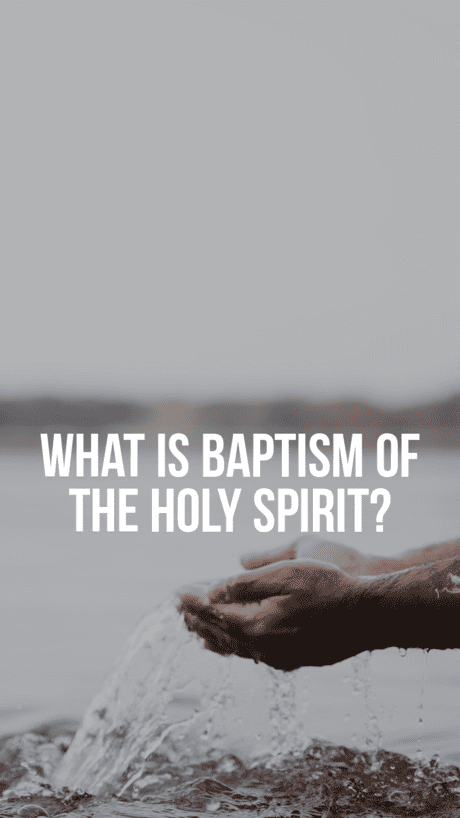
We all believe that as Christians the Holy Spirit dwells in us, and if we don’t have Him, we are not saved (Romans 8:9). But what if verses such as Acts 2:1-4 and 2:38 and 19:4-6 are all referring to a second, special outpouring of the Spirit that is for some other purpose? This is what Pentecostals believe and refer to as the baptism of the Holy Spirit. They did not invent the term; it’s found first in Matthew 3:11 where John the Baptist says, “I baptize you with water for repentance. But after me comes one who is more powerful than I, whose sandals I am not worthy to carry. He will baptize you with the Holy Spirit and fire.” Pentecostals believe that this baptism of the Spirit is accompanied by spiritual gifts such as speaking in tongues.
My reading of the relevant verses leads me to a somewhat different conclusion. I follow John Piper in seeing two senses of the term ‘baptism of the Holy Spirit’ in Scripture. First of all, there is the sense in which the Gospel writers, quoting Jesus, use it, specifically in Matthew and Luke. Luke 3:16 says, “John answered and said to them all, “As for me, I baptize you with water; but One is coming who is mightier than I, and I am not fit to untie the thong of His sandals; He will baptize you with the Holy Spirit and fire.”
Jesus also says in Acts 1:5, “for John baptized with water, but you will be baptized with the Holy Spirit not many days from now.” And soon after this, on the day of Pentecost, the disciples were filled with the Holy Spirit and began speaking in other tongues (Acts 2:4). This occurred as a fulfillment of a prophecy from Joel 2:28-29: “It will come about after this that I will pour out My Spirit on all mankind; and your sons and daughters will prophesy, your old men will dream dreams, your young men will see visions. Even on the male and female servants I will pour out My Spirit in those days.” I believe the disciples, the Twelve, were already saved at this point, and this was an abundant outpouring of the Spirit for power in ministry for the sake of the Gospel.
Contrast this sort of baptism of the Spirit with Paul’s usage of it in 1 Corinthians 12:12-13, where he says, “Just as the body is one and has many members, and all the members of the body, though many, are one body, so it is with Christ. For in one Spirit we were all baptized into one body — Jews or Greeks, slaves or free — and all were made to drink of one Spirit.” Here it seems that Paul is using the term ‘baptism’ in a spiritual sense, referring to justification by another name. As I said above, this is how I believe he’s using it in the famous passage in Romans 6, where he speaks of being buried with Christ in baptism.
Is the baptism of the Spirit in the first sense necessary for salvation? No. It is something that comes from God. He can choose to bestow it and to withhold it. It is up to Him. It’s a super-added gift, meaning one that is in addition to what we already have in salvation. Only those who are already in Christ can experience this baptism. A Pentecostal might respond by asking, “What about the Ephesian disciples in Acts 19?” That is admittedly a difficult passage, but I think it’s best understood as referring to unsaved followers of John the Baptist. They had clearly not fully heard or understood the Christian faith, nor even the preaching of John the Baptist. If they had, they would have followed Jesus, because that was the whole purpose of John’s ministry. Paul has to explain John’s baptism to them, which, once understood, leads them to immediately embrace Christ’s baptism. Then Paul lays his hands on them and they undergo the super-added baptism of the Holy Spirit.
34. Acts 1:4–5 “And being assembled together with them, He commanded them not to depart from Jerusalem, but to wait for the Promise of the Father, “which,” He said, “you have heard from Me; 5 for John truly baptized with water, but you shall be baptized with the Holy Spirit not many days from now.”
35. Acts 11:14-18 “He will bring you a message through which you and all your household will be saved.’ 15 “As I began to speak, the Holy Spirit came on them as he had come on us at the beginning. 16 Then I remembered what the Lord had said: ‘John baptized with water, but you will be baptized with the Holy Spirit.’ 17 So if God gave them the same gift he gave us who believed in the Lord Jesus Christ, who was I to think that I could stand in God’s way?” 18 When they heard this, they had no further objections and praised God, saying, “So then, even to Gentiles God has granted repentance that leads to life.”
36. Luke 3:16 “John answered them all, saying, “I baptize you with water, but he who is mightier than I is coming, the strap of whose sandals I am not worthy to untie. He will baptize you with the Holy Spirit and fire.”
37. Acts 1:8 “But you will receive power when the Holy Spirit has come upon you, and you will be my witnesses in Jerusalem and in all Judea and Samaria, and to the end of the earth.”
38. Acts 4:31 “And when they had prayed, the place in which they were gathered together was shaken, and they were all filled with the Holy Spirit and continued to speak the word of God with boldness.”
39. Ephesians 5:18 “And do not be drunk with wine, in which is dissipation; but be filled with the Spirit.”
40. Acts 19:4-6 “Paul said, “John’s baptism was a baptism of repentance. He told the people to believe in the one coming after him, that is, in Jesus.” 5 On hearing this, they were baptized in the name of the Lord Jesus. 6 When Paul placed his hands on them, the Holy Spirit came on them, and they spoke in tongues and prophesied.”
Why was Jesus baptized?
This is a question that has bugged me for a while and I still don’t feel like I have a final answer to it. I have thought of and heard some interesting answers, though, so I’ll pass these along. First of all, everyone agrees with John the Baptist in saying that we need baptism for the remission of sins–Christ does not. He was perfect and sinless. And yet, He chose to be baptized anyway, seeing it as working toward the fulfillment of all righteousness (Matthew 3:15).
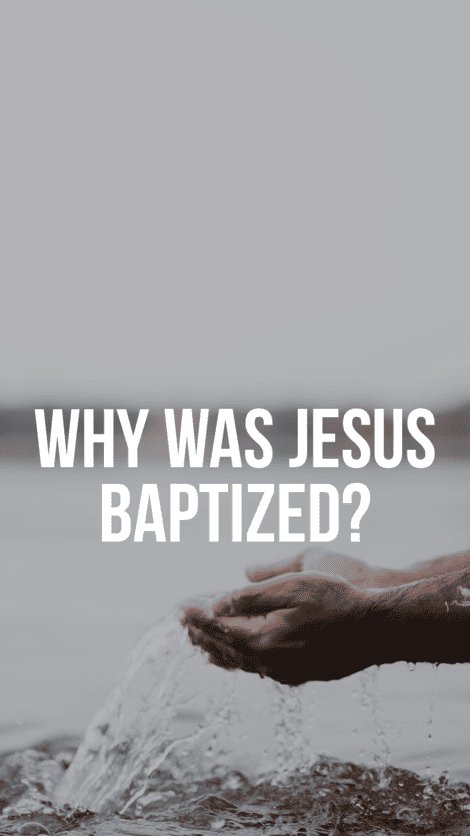
And of course, everyone sees the fact that Jesus was submitting to His Father in perfect obedience by getting baptized. The question is, why was the baptism fitting to fulfill all righteousness? What did it accomplish? I have heard two answers that I find persuasive. One is from Sinclair Ferguson who said said that Christ was in some sense baptized into us, His people, just as we in our baptisms are baptized into Him (Romans 6:3). Being baptized ‘into’ something or someone is a common Biblical way of understanding it. 1 Corinthians 10:2 says, “They [the Israelites] were all baptized into Moses in the cloud and in the sea.”
I find Hebrews 2:14-17 as a strong foundation for this reading: “Since therefore the children share in flesh and blood, he himself likewise partook of the same things, that through death he might destroy the one who has the power of death, that is, the devil, and deliver all those who through fear of death were subject to lifelong slavery. For surely it is not angels that he helps, but he helps the offspring of Abraham. Therefore he had to be made like his brothers in every respect, so that he might become a merciful and faithful high priest in the service of God, to make propitiation for the sins of the people.”
The second interesting take on Jesus’ baptism is one I have associated with one of my professors in grad school, Douglas Wilson. This one is typological (meaning it sees a New Testament fulfilment or antitype of an Old Testament foreshadowing or type). In this case, Jesus is the antitype of Israel in the Old Testament, He is the true and final Israel. Israel is called God’s son (Hosea 11:1-2) in the Old Testament, and in the New, Jesus is revealed as God’s son who is also God himself, the second person of the Trinity. Jesus obeys where Israel failed. Israel could not pass the Jordan River and take possession of the land as punishment for their unbelief. They were forced to wander in the wilderness for forty years. Jesus humbly and faithfully passed through the waters of the Jordan and went into the wilderness to be tempted for forty days, again faithfully, before coming to His people and entering his ministry. He did what Israel could not do.
41. Matthew 3:13-17 “Then Jesus came from Galilee to the Jordan to be baptized by John. 14 But John tried to deter him, saying, “I need to be baptized by you, and do you come to me?” 15 Jesus replied, “Let it be so now; it is proper for us to do this to fulfill all righteousness.” Then John consented. 16 As soon as Jesus was baptized, he went up out of the water. At that moment heaven was opened, and he saw the Spirit of God descending like a dove and alighting on him. 17 And a voice from heaven said, “This is my Son, whom I love; with him I am well pleased.”
42. John 1:32-34 “Then John gave this testimony: “I saw the Spirit come down from heaven as a dove and remain on him. 33 And I myself did not know him, but the one who sent me to baptize with water told me, ‘The man on whom you see the Spirit come down and remain is the one who will baptize with the Holy Spirit.’ 34 I have seen and I testify that this is God’s Chosen One.”
43. Mark 1:9-11 “At that time Jesus came from Nazareth in Galilee and was baptized by John in the Jordan. 10 Just as Jesus was coming up out of the water, he saw heaven being torn open and the Spirit descending on him like a dove. 11 And a voice came from heaven: “You are my Son, whom I love; with you I am well pleased.”
44. Luke 3:21-22 “When all the people were being baptized, Jesus was baptized too. And as he was praying, heaven was opened 22 and the Holy Spirit descended on him in bodily form like a dove. And a voice came from heaven: “You are my Son, whom I love; with you I am well pleased.”
and let there be no one to dwell in it’; and “Let another take his office.’ 21 So one of the men who have accompanied us during all the time that the Lord Jesus went in and out among us, 22 beginning from the baptism of John until the day when he was taken up from us—one of these men must become with us a witness to his resurrection.” 23 And they put forward two, Joseph called Barsabbas, who was also called Justus, and Matthias. 24 And they prayed and said, “You, Lord, who know the hearts of all, show which one of these two you have chosen 25 to take the place in this ministry and apostleship from which Judas turned aside to go to his own place.”
Who can be baptized?
This is one of the most pressing and practical questions we can ask regarding baptism. For me personally it’s even been painful. What I want to do in this section is lay out my own view and one alternative. As a credobaptist I believe that baptism is for believers, but I have spent a lot of time with brothers and sisters in Christ who believe that infants can and should be baptized if they are born to at least one believing parent. In fact, I was educated in grad school by men who held to this. I have great respect for them, so I want to give their view a fair hearing.

It’s easy for people raised in a baptistic upbringing (whether Baptist of some stripe or non-denominational) to think something like, “Well, the Bible doesn’t tell us to baptize infants and we never see any infants baptized, so what’s the stir about?” But this is an argument from ignorance. Credobaptists need to know why they do things differently than most of the church has done for most of history. We have the practical burden of proof even if, as I believe, the paedobaptists have the Biblical burden of proof. And yet, I’ll start by laying out the case for paedobaptism since that seems to be understood by fewer Christians in America (and perhaps the world) today. More particularly, I will lay out the Reformed evangelical understanding of it, not the Roman or Lutheran or Eastern Orthodox.
The Reformed paedobaptist position at root says that infants born into Christian homes should be baptized because they are members of the New Covenant. It doesn’t mean that infants are Christians, regenerated in their souls, but that they are called by God because they were born into this context and can be baptized as a seal of their status as covenant members.
John Calvin says, “We have, therefore, a spiritual promise given to the fathers in circumcision, similar to that which is given to us in baptism, since it figured to them both the forgiveness of sins and the mortification of the flesh. Besides, as we have shown that Christ, in whom both of these reside, is the foundation of baptism, so must he also be the foundation of circumcision. For he is promised to Abraham, and in him all nations are blessed.
To seal this grace, the sign of circumcision is added.” (Institutes Book 4, Ch. 16) This is at the heart of the difference. Paedobaptists see a strong continuity between the Old Testament practice of circumcision and New Testament baptism. Just as the eight-day-old Israelite boy could receive the covenant sign of circumcision to show he was a member of the Mosaic and Abrahamic Covenants, so Christian infants can be sprinkled with water to show they are part of God’s work on earth through Christ. They find support for this in Colossians 2:11-12, which says, “and in Him you were also circumcised with a circumcision made without hands, in the removal of the body of the flesh by the circumcision of Christ; having been buried with Him in baptism, in which you were also raised up with Him…” Circumcision and baptism, it is argued, are connected here and so can be administered to the same people: covenant members, adult and infant. Baptism is also seen as a seal of God’s promise to raise up many generations of faithful followers to his people (Deuteronomy 7:9, Acts 2:39).
The credobaptist, by contrast, believes that Christian baptism, beginning with John the Baptist, is for the remission of sins (Mark 1:4), and sins can only by remitted or forgiven after repentance and confession (Acts 2:38, Romans 10:9). The great verse on this is Romans 10:9 which says, “that if you confess with your mouth, “Jesus is Lord,” and believe in your heart that God raised Him from the dead, you will be saved.” Confessing and believing seem to be acts that only adolescents and adults can perform, not infants. Thus, infants would not be fit subjects of baptism. Evangelical paedobaptists agree that baptism does not effect regeneration, so it follows that a baptism for the forgiveness of sins means a baptism to seal and symbolize a forgiveness that has already taken place in the sinner, or one that will take place. But there is no promise that all children of Christians will embrace the faith of their parents. We see wayward offspring all too often in the church. So that second option is ruled out and we are left with a baptism for the professing Christian. Most clear of all, perhaps, is 1 Peter 3:21 which says, “Corresponding to that, baptism now saves you–not the removal of dirt from the flesh, but an appeal to God for a clean conscience–through the resurrection of Jesus Christ”. This verse is taken to be a clear description of what baptism is or symbolizes. As an aside, if baptism is closely connected with the imagery of the Flood (as it is here), this is another weight to add on the scale in favor of immersion only, since that seems to better picture bodily passage through a large amount of water. For myself, as I said above, I’m not sure this verse is speaking directly about water baptism, but it does seem to make sense that water baptism should reflect as fully as possible the spiritual reality. Despite all the differences, though, I believe there can be (in some places there is) great unity between Gospel-believing credo- and paedobaptists. They can evangelize together, take communion together, worship together. Wherever permitted by Scripture and conscience, true Christians of any baptismal persuasion ought to love and work with and learn from one another wherever possible for the sake of unity (Ephesians 4:3-6).
There is much more that could be said on this, but I have to move on to the second part of this section which deals with who can do the baptizing. You might think that one commonly held tenet across Christendom would be that a person has to at least be a Christian to baptize another Christian, but that’s actually not the case. The Roman Catechism allows for non-believers to baptize believers as long as they use the proper Trinitarian formula and will the same thing the church wills when it baptizes. And this position is common throughout other forms of Christianity.
For myself, I don’t believe non-Christians can legitimately baptize Christians. The flexibility of the above stance is based on a certain view of baptism which says that ultimately God is performing every true baptism (which I addressed above).
46. Acts 2:40-42 With many other words he warned them; and he pleaded with them, “Save yourselves from this corrupt generation.” Those who accepted his message were baptized, and about three thousand were added to their number that day.
47. Acts 10:47-48 “Surely no one can stand in the way of their being baptized with water. They have received the Holy Spirit just as we have.” 48 So he ordered that they be baptized in the name of Jesus Christ. Then they asked Peter to stay with them for a few days.”
48. Acts 16:30-34 They replied, “Believe in the Lord Jesus, and you will be saved—you and your household.” 32 Then they spoke the word of the Lord to him and to all the others in his house. 33 At that hour of the night the jailer took them and washed their wounds; then immediately he and all his household were baptized. 34 The jailer brought them into his house and set a meal before them; he was filled with joy because he had come to believe in God—he and his whole household.”
49. Acts 22:14-16 “And he said, ‘The God of our fathers appointed you to know his will, to see the Righteous One and to hear a voice from his mouth; 15 for you will be a witness for him to everyone of what you have seen and heard. 16 And now why do you wait? Rise and be baptized and wash away your sins, calling on his name.”
Who can baptize according to the Bible?
I take the position that elders of a local church are the properly appointed administrators of baptism–and the Lord’s Supper, the other church ordinance. If there is an extreme circumstance in which only two believers exist, one can baptize the other, since in this case these two constitute a local church–as Jesus said, “For where two or three gather together in My name, there am I with them.” (Matthew 18:20) This verse is ground zero for our understanding of the church.
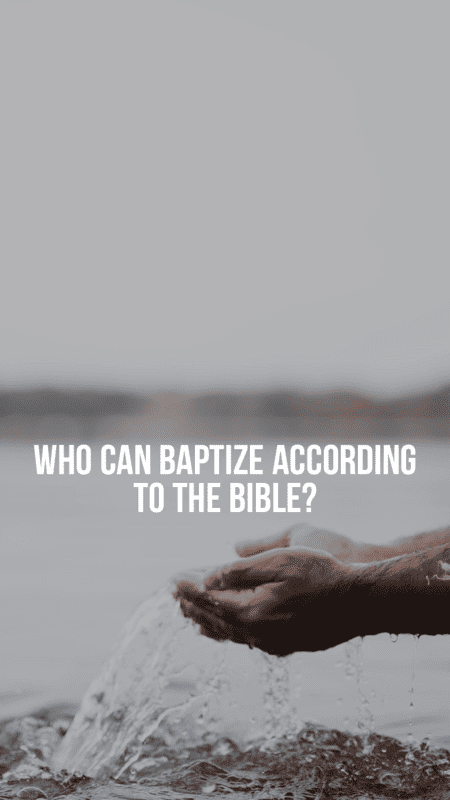
The two ordinances that Jesus left with His people, the Lord’s Supper and baptism, belong to the church. And more specifically, they belong to every true local body of believers that gather together around these two sacraments and the preaching of God’s word. This, I believe, is why Paul did not primarily concern himself with baptizing new believers (1 Corinthians 1:14). He considered that part of the responsibility of specific churches and their elders. The same seems to go for Peter, as we see in Acts 10:48, where he himself did not baptize Cornelius’ household but “ordered that they be baptized in the name of Jesus Christ.” The Apostles were careful not to make it seem like someone was specially endowed with any extra gifts because he had been baptized by an Apostle. However, it’s not that they never did it; Philip baptized the Eunuch, and Paul baptized Crispus and Gaius in the Corinthians passage cited above.
Another foundational text in a right ecclesiology is 1 Corinthians 5, where Paul makes it clear that the responsibility for discipline and instruction lies with each local assembly of believers, each congregation. In verse 13 he says, “But those who are outside, God judges. Remove the wicked man from among yourselves.” He is telling all the congregation to remove this immoral man who was sleeping with his father’s wife. It was the responsibility of all of them–not the elders, not a presbytery, not the Apostles, but each and every individual communing Christian in the church of Corinth. And if it is the church which is expected to baptize, and the church which is expected to discipline, and to take the Supper together, then we see that the ordinances belong to the church. Baptism, then is the church’s responsibility.
Matthew 18:18-19 make clear that it is the gathered body of believers which wields authority on earth for Christ. “Truly I saw to you, whatever you bind on earth shall have been bound in heaven; and whatever you loose on earth shall have been loosed in heaven. Again I say to you, that if two of your agree on earth about anything that they may ask, it shall be done for them by My Father who is in heaven.”
We are the body of which He is the head, and Jesus breaks this down to units as small as two or three believers gathered in a particular place. If we act in accordance with our head, we act on behalf of heaven. Thus, it is the congregation of local churches that has the authority to decide who can be baptized and the ability to execute that baptism.
I said earlier that I had more to say about a credible profession of faith. This is it. If a church affirms the testimony of an applicant for baptism, recognizing that person’s Christian fruit, this carries the weight of heaven. Someone might say, “Well then, why can’t me and my two friends baptize someone since we are believers?” The answer is that, if these two or three believers come together to constitute a local church, then they do have that authority, because they are a church. But if they are just Christian friends who hang out sometimes, they ought not baptize anyone, if there are actual churches nearby which can perform the baptism.
50. Acts 8:38 “And he gave orders to stop the chariot. Then both Philip and the eunuch went down into the water and Philip baptized him.”
Conclusion
I have just scratched the surface of the topic of baptism. Many more questions have probably been raised than answered by this post, and that’s okay. I would be happy to know that its effect was to make people go to their Bibles and study the relevant verses for themselves. May God use this as a launchpad for much study and reflection and laying hold of truth.
Author Bio
Noah Nevils is a South Florida-based writer and blogger at Make the People Human Again, on Substack, where he shares his thoughts from a Biblical perspective. He got his BFA in Screenwriting from Azusa Pacific University, and a Master of Arts in Theology and Letters from New Saint Andrews College. Check out noahnevils.substack.com.

